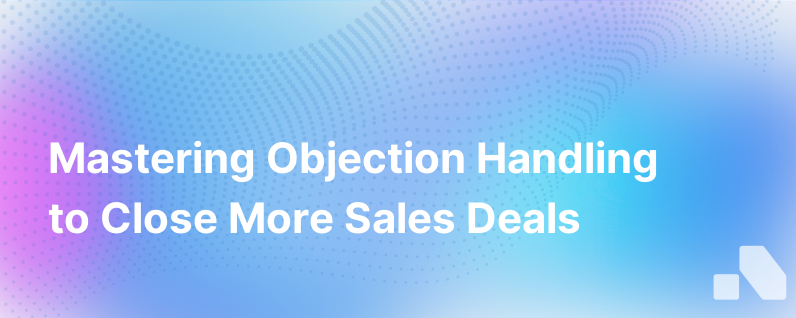
In the world of B2B sales, objections are as inevitable as the need for a strong product-market fit. Rather than viewing objections as setbacks, successful sales teams see them as opportunities to deepen the conversation and demonstrate value.
We'll explore objection handling as a strategic component in sales, offering a roadmap to not only managing but also leveraging objections to close more deals and forge stronger relationships with your prospects.
The Nature of Sales Objections
Objections in sales can range from budgetary constraints and timing issues to product fit concerns and competitor comparisons. Understanding that objections are not outright rejections but rather calls for more information is pivotal.
While some objections might seem to spell the end of a deal, they often signal that a prospect is engaged enough to want additional clarification. This dialogue is key to navigating towards a successful close.
A Structured Approach to Objection Handling
To effectively handle objections, it's crucial to approach them with a structured methodology, one that is empathetic, informed, and strategic.
- Listen Fully: Active listening brings clarity to the objection. Resist the urge to interrupt and instead, show your prospect they are heard.
- Clarify: Make sure you fully understand the objection. Ask questions to delve into the heart of the concern.
- Acknowledge: Show that you respect their perspective. Validating their concerns can build trust and openness in the conversation.
- Isolate: Confirm that this is the only obstacle preventing a decision. Ask "If we were able to address this issue, would you be prepared to move forward?"
- Respond: Once you've isolated the objection, present a tailored solution or provide the information needed to alleviate their concerns. Be honest—if you can't meet a specific need, it's better to walk away than to overpromise.
- Confirm: Make sure you've addressed their objection to their satisfaction before moving on.
Utilizing this structure ensures that you thoroughly understand the objection and are prepared to address it effectively.
Common Sales Objections and How to Navigate Them
Objections vary widely, but there are several that sales teams encounter regularly. Here’s how to navigate some of the most common:
-
Price Objections: These are often not just about the actual price but the perceived value. It is important to understand what aspect of the pricing is objectionable and respond by reinforcing the unique benefits and ROI of your offering.
-
Product Fit Objections: When a prospect doesn't see how your product fits their needs, it's critical to revisit their pain points and highlight product features that specifically address those issues.
-
Competitor Objections: Competition is natural. When prospects compare you to competitors, it's an opportunity to differentiate and highlight why your offering is superior for their specific needs.
-
Timing Objections: "Now is not a good time." Understanding what's driving the timing issue can uncover hidden objections or lead to setting a well-defined follow-up plan.
-
Status Quo Objections: Change is hard. When a prospect is resistant to change, emphasize the cost of inaction and the long-term benefits of taking the leap.
Tools and Techniques for Advanced Objection Handling
Successful objection handling also requires a suite of tools and strategies to empower sales reps:
-
Knowledge Database: Have a repository of product information, competitive intel, and case studies so sales reps have ready answers to common objections.
-
Role-Playing Scenarios: Regular training with hypothetical objection scenarios can prepare reps to handle real-life situations with confidence.
-
Objection Analysis: Collect data on the objections you encounter and analyze them to improve your product, messaging, and sales strategy.
-
Customer Testimonials: Share stories of satisfied customers who had similar objections to demonstrate successful outcomes.
-
Evidence-Based Selling: Utilize data and case studies to make a compelling, factual case in response to objections relating to performance or value.
Emotional Intelligence in Objection Handling
Emotional intelligence is a powerful asset in sales. A rep skilled in reading a prospect’s emotional cues and adjusting their approach can often turn a challenging objection into a successful conversion.
Empathize with your prospect’s concerns, and strive to build a rapport that fosters trust and collaboration. This approach often uncovers underlying issues and concerns that, once addressed, pave the way to closing the sale.
Leveraging Technology to Streamline Objection Handling
Modern sales teams don't face objections alone. Technology like Aomni provides powerful tools and insights to help reps prepare for and handle objections more effectively.
Real-time account research and competitive insights delivered by platforms like Aomni enable sales reps to personalize their responses and strengthen their argumentation when facing objections.
Conclusion
Objection handling is a critical skill in the art and science of sales—one that separates top-performing reps from their peers. Mastering it requires a blend of active listening, empathy, strategic thought, in-depth product knowledge, and emotional intelligence.
By approaching objections as opportunities, sales professionals can demonstrate the value of their solutions, build trust, and forge deeper customer relationships, all while driving towards a successful sale.
Remember, every objection overcome is a step closer to a closed deal and a more satisfied customer.
For an AI-driven advantage in objection handling, sales teams might consider the strategic support offered by digital platforms like Aomni, which can provide the real-time insights necessary to counter objections more effectively and ultimately drive revenue growth.